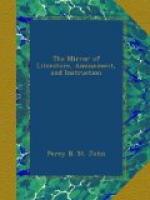Forster, in his “Researches about Atmospheric Phenomena,” notices several prognostics of the weather by plants. Thus, Chickweed has been said to be an excellent weather-guide. When the flower expands freely, no rain need be feared for a long time. In showery days the flower appears half concealed, and this state may be regarded as indicative of showery weather; when it is entirely shut, we may expect a rainy day. If the flowers of the Siberian sowthistle remain open all night, we may expect rain next day. Before showers, the trefoil contracts its leaves. Lord Bacon observes, that the trefoil has its stalk more erect against rain. He also mentions a small red flower, growing in stubble-fields, called by the country people wincopipe, which, if it opens in the morning, assures us of a fine day.
* * * * *
TRAVELS
Pen and Pencil Sketches
of India, being the Journal of a Tour
in India. By Captain
Mundy.
These are two very amusing volumes of scenes and situations full of stirring interest, as their criticships would say—for example the four extracts immediately following:
Palankeen Travelling and a Sortie of Tigers.
“To those unitiated into the mysteries of Indian travelling, the prospect of a journey of six hundred miles, night and day, in a hot climate, inclosed in a sort of coffin-like receptacle, carried on the shoulders of men, is somewhat alarming; but to one more accustomed to that method of locomotion, the palankeen would, perhaps, prove less fatiguing and harassing, for a long journey, than any other conveyance.
“The horizontal or reclining position is naturally the most easy to the body; and the exhaustion consequent upon a journey in the heat of the day, generally secures to the traveller as much sleep during the cooller hours of the night, as the frequent interruptions of the bearers at the several stages will allow him to enjoy. I had laid in a good store of tea, sugar, and biscuits, a novel, some powder and shot, a gun, and a sword, and plenty of blankets, as a defence against the coldness of the night. Our baggage consisted of a dozen boxes (patarras) appended to bamboos, and carried by men: these, with two torch-bearers (mussalgees) to each palankeen, completed our cavalcade.
“Nov. 24th, 7 A.M., reached Hazarebaug, a small station, about two hundred and twenty miles from Calcutta. It is a healthy spot; the earth sandy and rocky, presenting a strong contrast to the loomy and alluvial soil of Southern Bengal. From Rogonnathpore to Hazarebaug the road runs through an almost uninterrupted jungle, swarming with wild beasts. At this place we met with a hospitable friend, who stored our palankeens with provisions, after giving us a capital breakfast.




